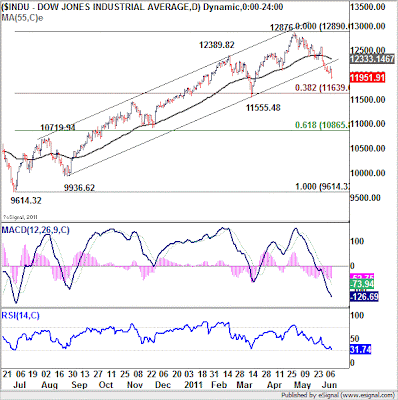Dollar and yen were broadly higher last week as boosted bby reversal in Euro as well as deterioration in risk sentiments. The common currency was pressured by uncertainty over the Greece situation as well as adjustments in rate expectations after ECB's latest inflation projection failed to satisfy Euro bulls. Global equities extended recent decline on concern of slowing global recovery. Meanwhile, New Zealand dollar was indeed the strongest currency as RBNZ signaled gradual tightening ahead.
The disagreement between ECB, EC and Germany on how private investors should be involved in Greece's second bailout heat up further last week. German Finance Minister Schaeuble called for privated investors to assume a fair share of additional aid to Greece. EC Juncker supported that but emphasized what Greece needs is a "soft, voluntary restructuring". Meanwhile, ECB Trichet has made it clear again that the bank opposes to any kind of restructuring. Juncker noted that the authorities couldn't push through a "private lender participation without and against the ECB". There are much uncertainties on what final plan would be agreed at the EU summit on June 24, even if there would be an agreement.
ECB Trichet signaled a July rate hike by using the coded word "vigilance" in the post meeting conference, where rates was left unchanged at 1.25%. Nevertheless, the latest staff inflation projections were disappointing. Inflation is expected to be at 2.5-2.7% in 2011 and at 1.1-2.3% in 2012. That compared with march projection of 2.0-2.6% in 2011 and 1.0-2.4% in 2012. While inflation for 2011 was clearly revised up, the picture for 2012 was less certain as the lower band was revised up but the upper band was revised down. Markets are now pricing in 70 bps hike over the next year, down from 81 bps prior to the meeting. That is, the third rate hike in the next twelve months is uncertain.
Investors' concern over slowing global economic recovery intensified last week and pushed equities lower. DOW dropped for the sixth straight week, the longest losing streak since 2002. DOW's sustained trading below the medium term channel support confrimed reversal while Friday's move indicates downside acceleration. Fall from 12876 is at leaset correcting the whole rally from 9614.32. We're not too bearish in stocks yet and will have our focus on 11555.48 key support level, which is near to 38.2% retraceemtn of 9614 to 12876 at 11639.
The strong rebound in dollar index last week suggests that fall from 76.36 was merely a correction and has completed. Rise from 72.69 could be resuming and near term bias is now on the upside for a retest on 76.36 first. Break there will raise the prospect that dollar index has bottomed out in medium term at 72.69 on bullish convergence condition in daily MACD. In any case, though, we won't turn commit to a bullish stance before a break of 76.36.
New Zealand dollar was the strongest currency last week after RBNZ left rates unchanged at 2.50% but said that the Official Cash Rate will be increased gradually over the next two years to offset rising underlying inflation as GDP growth picks up. The timing of rate hike, though, will be dependent on the pace of recovery. The bank noted in the statement that economic outlook has improved since publication of March statement. "Negative confidence effect" of the Christchurch earthquake has been "limited" in other parts of the country. Signs of recovery have "continued" and reconstruction in Canterbury will add 2% to GDP growth over 2012. Nevertheless, household spending will grow "only modestly" and activities will be dampened by fiscal consolidation. Strength of NZD will also negatively affect tradable sectors. "Underlying inflation remains constrained" so far.
The Week Ahead
Here are some of the key events for next week.
- Monday: BoE quarterly bulletin
- Tuesday: UK RICS house price balance; China CPI; BoJ rate decision; UK CPI; US retail sales, PPI, business invesntories; New Zealand retail salers
- Wednesday: Australia housing starts; UK job data; US CPI, Empire state manufacutirng, TIC capital flow, industrrial production; NAHB housing market index
- Thursday: SNB rate decision; UK retail sales; US new residential construction, Philly Fed survey
- Friday: Eurozone trade balance; US U of Michigan sentiment, leading indicator; Canada wholesale sales
EUR/USD Weekly Outlook
EUR/USD's sharp fall and break of 1.4344 support last week argues that rebound from 1.3969 might have completed at 1.4695 already. Initial bias is on the downside this week for 1.3969 first. Break will confirm that whole correction from 1.4938 has resumed and should target 100% projection of 1.4938 to 1.3969 from 1.4695 at 1.3726 next. On the upside, above 1.4477 minor resistance will turn bias neutral and bring recovery. But risk will remain mildly on the downside as long as 1.4695 resistance holds.
In the bigger picture, EUR/USD is still trading above medium term trend line support from 1.1875 (now at 1.3562) and thus, rise from there should still be in progress. We'd continue to favor the bullish case that correction from 1.6039 has completed with three waves down to 1.1875 already and. Above 1.4938 will target 1.5143 resistance first. Break will affirm the bullish case of long term up trend resumption for another high above 1.6039. However, sustained trading below the mentioned trend line support will indicate that there should at least be one more medium term decline, possibly for below 1.1875, before correction from 1.6039 completes.
In the long term picture, correction from 1.6039 might have completed at 1.1875 already. Meanwhile, up trend from 2000 low of 0.8223 might be resuming. Break of 1.5143 resistance will affirm this case and should pave the wave through 2008 high of 1.6039 to 61.8% projection of 0.8223 to 1.6039 from 1.1875 at 1.6705.



No comments:
Post a Comment